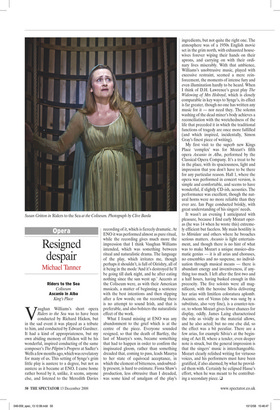Resigned despair
Michael Tanner
Riders to the sea Coliseum Ascanio in Alba King’s Place
Vaughan Williams’s short opera Riders to the Sea was to have been conducted by Richard Hickox, but in the sad event it was played as a tribute to him, and conducted by Edward Gardner. It had a kind of appropriateness, but my own abiding memory of Hickox will be his wonderful, inspired conducting of the same composer’s The Pilgrim’s Progress at Sadler’s Wells a few months ago, which was revelatory for many of us. This setting of Synge’s grim little play is austere to a degree, but not as austere as it became at ENO. I came home rather bored by it, unlike, it seems, anyone else, and listened to the Meredith Davies recording of it, which is fiercely dramatic. At ENO it was performed almost as pure ritual, while the recording gives much more the impression that I think Vaughan Williams intended, which was something between ritual and naturalistic drama. The language of the play, which irritates me, though perhaps it shouldn’t, is full of Oirishry, all of it being in the mode ‘And it’s destroyed he’ll be going till dark night, and he after eating nothing since the sun went up.’ Accents at the Coliseum were, as with their American musicals, a matter of beginning a sentence with the best intentions and then slipping after a few words; on the recording there is no attempt to sound Irish, and that is preferable, and also bolsters the naturalistic effect of the work.
What I found missing at ENO was any abandonment to the grief which is at the centre of the piece. Everyone sounded resigned, so that the death of Bartley, the last of Maurya’s sons, became something that had to happen in order to confirm the inspissated gloom, rather than something dreaded that, coming to pass, leads Maurya to her state of equivocal acceptance, in which the element of bitterness, undoubtedly present, is hard to estimate. Fiona Shaw’s production, less obtrusive than I dreaded, was some kind of amalgam of the play’s ingredients, but not quite the right one. The atmosphere was of a 1950s English movie set in the grim north, with exhausted housewives forever wiping their hands on their aprons, and carrying on with their ordinary lives miserably. With that ambience, Williams’s unobtrusive music, played with excessive restraint, seemed a mere reinforcement, the moments of intense fury and even illumination hardly to be heard. When I think of D.H. Lawrence’s great play The Widowing of Mrs Holroyd, which is closely comparable in key ways to Synge’s, its effect is far greater, though no one has written any music for it — nor need they. The solemn washing of the dead miner’s body achieves a reconciliation with the wretchedness of the life that preceded it in which the traditional functions of tragedy are once more fulfilled (and which inspired, incidentally, Simon Gray’s finest piece of writing).
My first visit to the superb new Kings Place ‘complex’ was for Mozart’s fifth opera Ascanio in Alba, performed by the Classical Opera Company. It’s a treat to be in the place, with its spaciousness, light and impression that you don’t have to be there for any particular reason. Hall 1, where the opera was performed in concert version, is simple and comfortable, and seems to have wonderful, if slightly CD-ish, acoustics. The performance was excellent, though the natural horns were no more reliable than they ever are. Ian Page conducted briskly, with great understanding of his singers’ needs.
It wasn’t an evening I anticipated with pleasure, because I find early Mozart operas (he was 14 when he wrote this) extremely efficient but faceless. My main hostility is to Mitridate and others where he broaches serious matters. Ascanio is light entertainment, and though there is no hint of what was to make Mozart a unique musico–dramatic genius — it is all arias and choruses, no ensembles and no suspense, no individuation through musical means — there is abundant energy and inventiveness, if anything too much. I left after the first two and a half hours, having basked enough in this precocity. The five soloists were all magnificent, with the heroine Silvia delivering her arias with limitless coloratura aplomb. Ascanio, son of Venus (she was sung by a substitute, also very fine), is a counter-tenor, to whom Mozart gives fewer chances for display, oddly. James Laing characterised the role as vividly as the material allows, and he also acted; but no one else did, so the effect was a bit peculiar. There are a few arias, for example Silvia’s at the beginning of Act II, where a tender, even deeper note is struck, but the general impression is that the singers’ music is interchangeable. Mozart clearly relished writing for virtuoso voices, and his performers must have been gratified, if also alarmed, by what he provided them with. Certainly he eclipsed Hasse’s effort, when he was meant to be contributing a secondary piece. ❑










































































 Previous page
Previous page